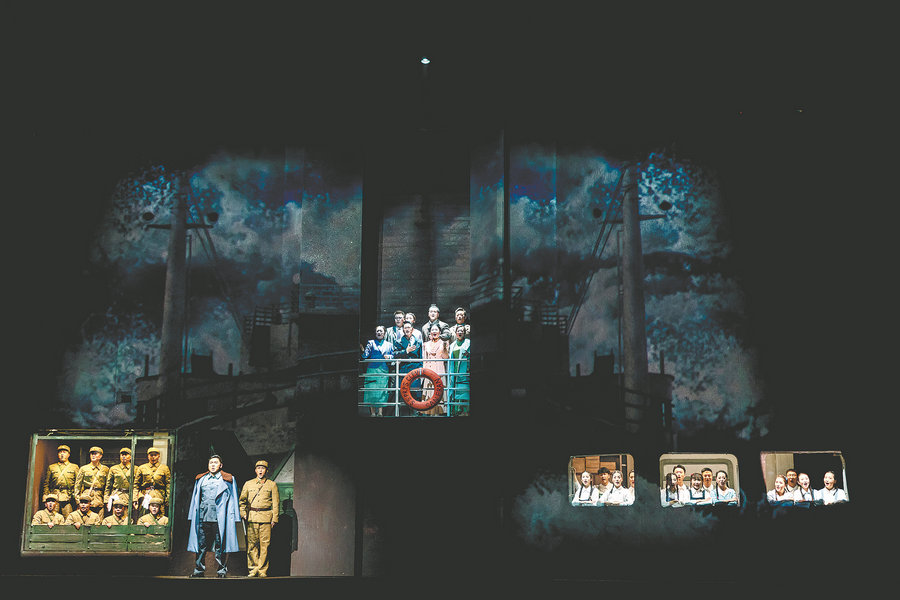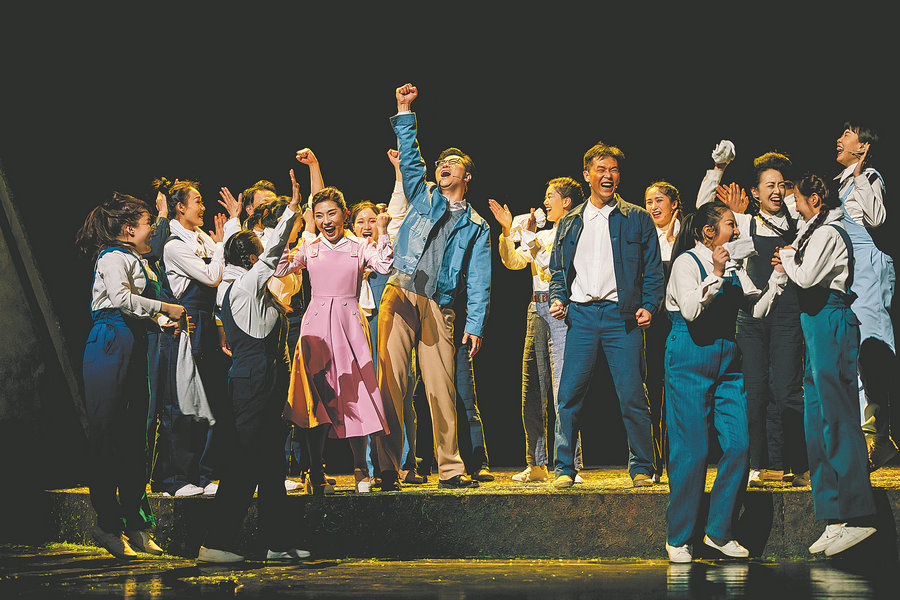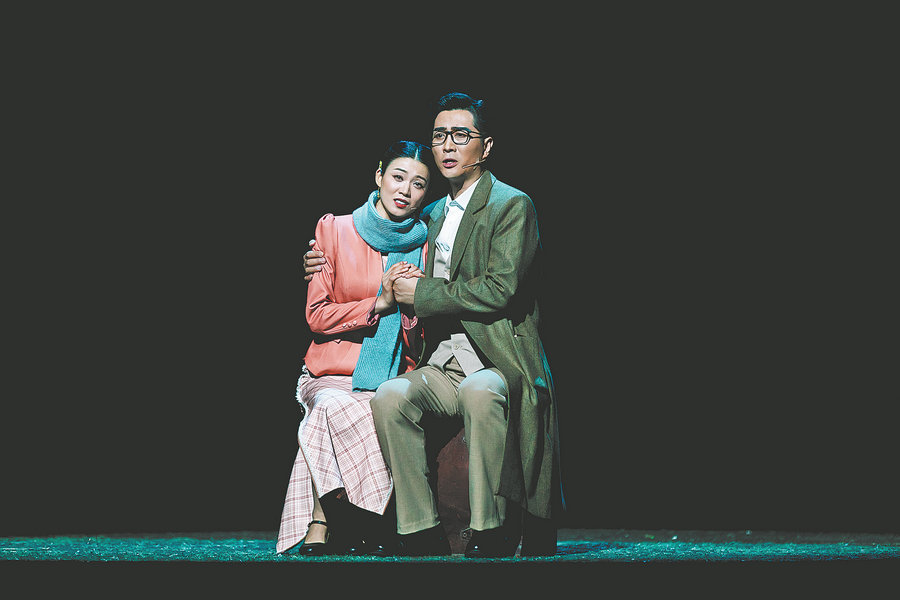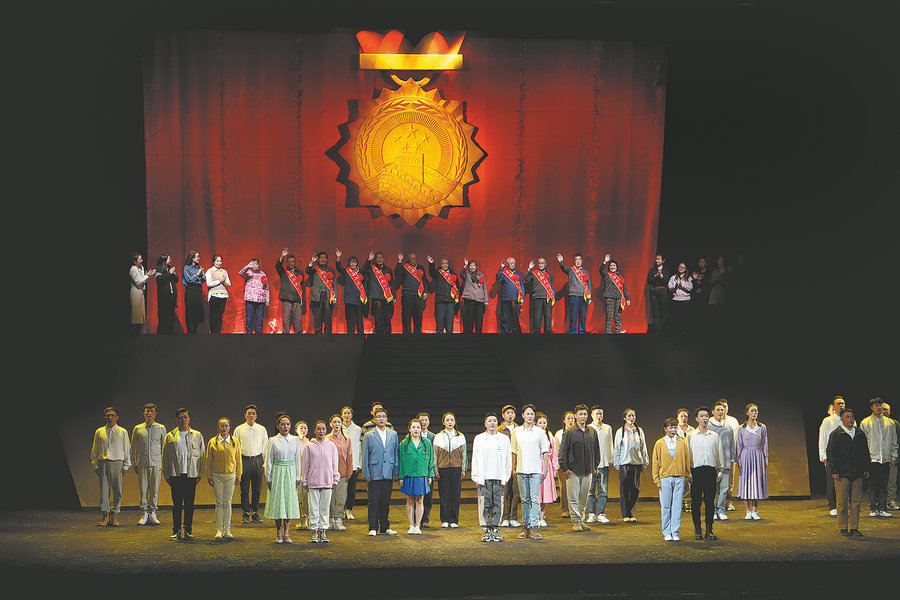Opera honors unsung heroes

For many Chinese people, the Jinyintan grassland in Qinghai province may not ring a bell, but they are likely to have heard of the classic song, In a Faraway Place, written by composer Wang Luobin after his visit to the area.
During the latter decades of the last century, the region fell into silence, but when it reemerged in the public eye, it became known not only for its stunning natural landscape, but also as the cradle of China's national defense accomplishments.
In the 1950s, China launched the Two Bombs and One Satellite project, independently researching and developing the atomic bomb and hydrogen bomb, an intercontinental ballistic missile and an artificial satellite.
It was at the Jinyintan grassland that Base 221, China's first nuclear research facility, was established. Many educated youths from around the country, with a vague idea of their job responsibilities, willingly left their homes in big cities and devoted their youth to working at the base.

A recent opera, For the Honor of My Country, by the Qinghai Performing Arts Group, zooms in on the untold stories of these young people, many of whom served as ordinary staff members and remained anonymous until this century.
After arriving at Beijing's National Centre for the Performing Arts on May 6 and 7, the opera graced the stage of Zhejiang province's Hangzhou Grand Theatre on May 18 and 19, being awarded as an excellent production at the fifth China Opera Festival.
Production director Xing Shimiao used to be a soldier himself, working as the head of a military art troupe. During his time in the army, he made an oath to himself that he would primarily work on stories about soldiers.
He had, back in 2014, created a modern Peking Opera production, Seven Months and Four Days, which illustrates the story of General Mu Shengzhong, who directed the construction of the Qinghai-Tibet Highway.
For that production, he embarked on a field trip to Qinghai for the first time in 2013, but then he had never heard of the Base 221, let alone the stories of the countless individuals involved.
"It astonished me that the base had little publicity. Our country relied on the national defense achievements of Base 221 to maintain a solid foundation and stand tall. I truly admire the people of Qinghai and those unsung heroes at the base," Xing says.

Between December 2021 and July 2022, along with other members of the production crew, he went on four field trips to the region, visiting the former site of the base, a memorial hall, and homes of the retired workers.
As he conversed with the individuals and delved deeper into their life experiences, he continued to be moved, and further determined to tell their stories.
A lot of the production's characters and events are based on true stories Xing discovered, including the protagonist Liang Zhendao and his girlfriend Li Yan. In real life, a couple went to work at the base, but they didn't know which branch factory the other worked at.
In both the production and the real story, due to the complete confidentiality of the project, even though they were only a stone's throw away from each other, for years they couldn't see or communicate with the other.
"We have been honoring and remembering the prominent scientists in the Two Bombs and One Satellite project, but behind them are tens of thousands of unknown people, who dedicated their youth and even their entire lives to the project," Xing says.
To make it up to them, the crew designed an epilogue for the production, where the names and hometowns of the heroes are solemnly announced one by one. But even so, it is impossible to call out the names of thousands of people, and the crew had to choose the representative ones.

In addition, for the production's Qinghai premiere, Xing invited onstage 12 former workers at the base, now more than 80 years old, who remained unknown for the vast majority of their lives.
"These elderly people were welcomed with a standing ovation. This is not a conventional practice for a stage production, rather, it's more like an awarding ceremony. But I had to add this section, because they deserve to be honored," he adds.
Classified as an opera, the production incorporates the music genre, orchestra music and Chinese folk music styles, to present the sentiments of ordinary people during grand historical events.
Tang Jianping, composer for the production, says that the music compositions are in line with the storyline, targeting the grand narrative from the aspects of diverse individuals.
"String instruments are particularly expressive when portraying the characters' emotions and fervor. The brass and percussion instruments are able to evoke the zeitgeist of young people, embarking on journeys to the plateau in Northwest China out of a shared aspiration," Tang says.
With the melodious and lingering tunes of Qinghai folk songs, coupled with descriptive lyrics, the songs depict the boundless landscape of the grassland, and immediately give the audience an idea of what it's like being on the plateau, where the sky is low and the stars are clearly visible.
Working on the production also allowed Tang to empathize closely with the workers of Base 221: "As creators we must delve into the inner world of the characters, experiencing their emotions and understanding their spirits. It is a mental challenge that must be overcome."
Lu Xiaohua, general manager of the Qinghai Performing Arts Group, says that Xing and Tang were chosen for this production because of their exuberant energy and unwavering commitment to their work.
According to Lu, since its founding in 2012, the group tried to make use of Qinghai's local resources and tell its representative stories onstage.
They planned to stage the story of Base 221 for several years, but never found a suitable point of entry, as the project seemed too grand to be reduced to a stage production.
"At first, we drafted a script that centered on the national plan and the prominent figures in this project, but it seemed a better idea for the production crew to write about ordinary individuals," Lu says.
"For the Honor of My Country is about how these people devoted their youthful years to the base and the project — their dedication, selflessness, passion, and deep love for both their own families and the nation."
Related articles
-
 Amazing Face Changing! Beijing Opera Facial Makeup Art
Amazing Face Changing! Beijing Opera Facial Makeup ArtMore
-
 Zhuhai Performing Arts Group presents Cantonese Opera in Beijing
Zhuhai Performing Arts Group presents Cantonese Opera in BeijingMore
-
 Beijing People's Art Theater showcases rising talent in adaptation of 'Plaza Suite'
Beijing People's Art Theater showcases rising talent in adaptation of 'Plaza Suite'More
-
 Peking Opera company unveils spring season featuring new works and tributes to masters
Peking Opera company unveils spring season featuring new works and tributes to mastersMore
-
 Classic play gets act together
Classic play gets act togetherMore
-
 Entertainment with ancient roots tunes into a modern following
Entertainment with ancient roots tunes into a modern followingMore
